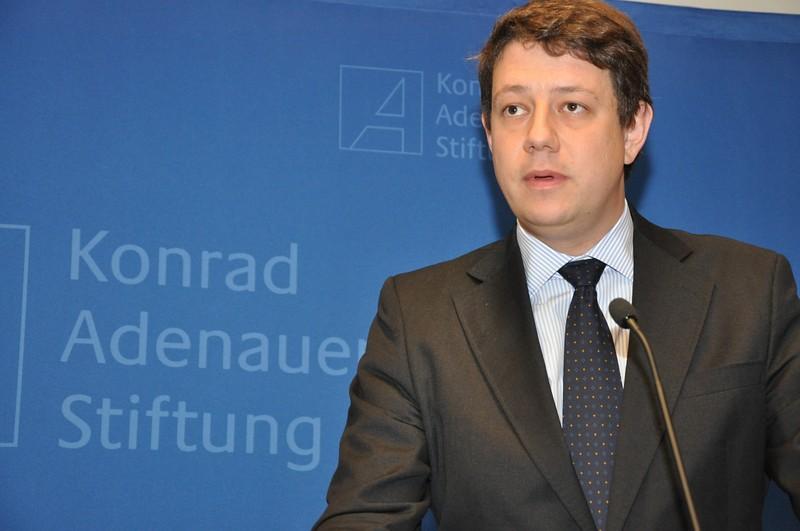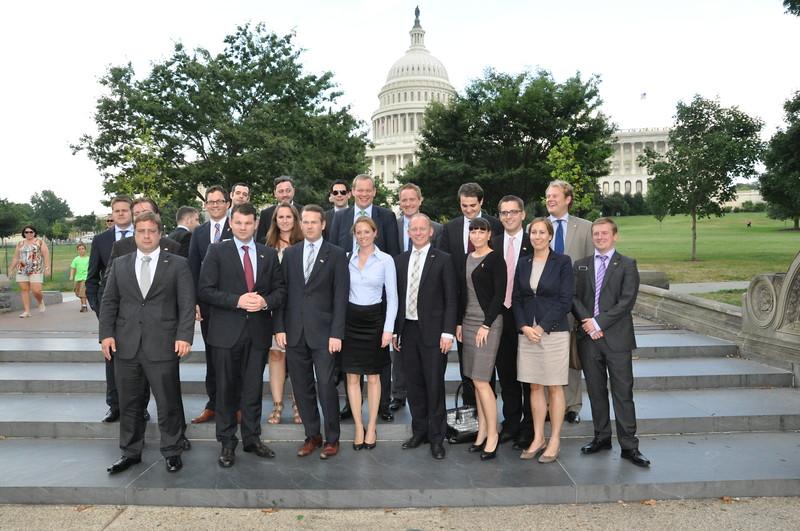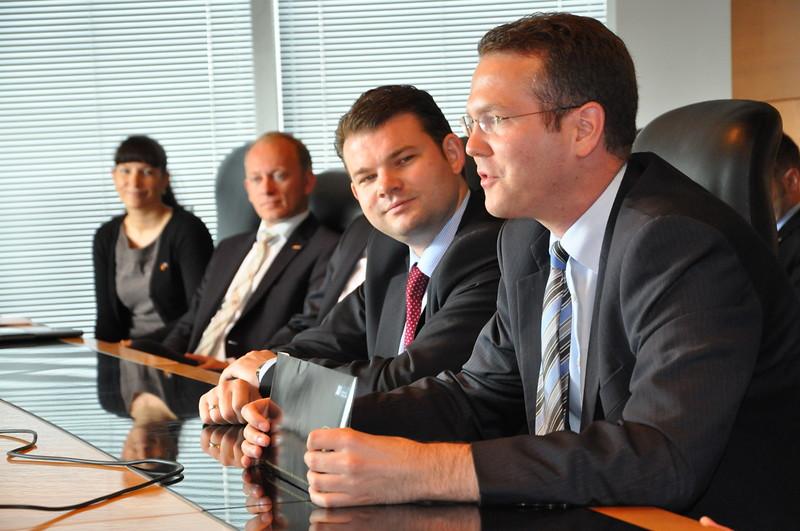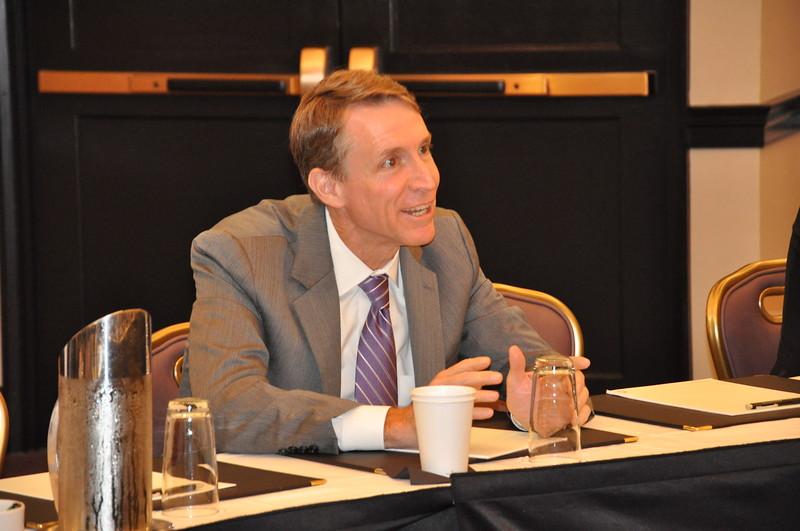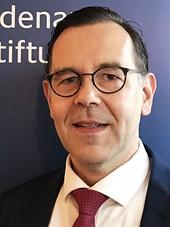Event reports
A group of young elected officials and political activists traveled to the United States from July 9-13 to meet with communications strategists, policy advisors and elections experts. Led by Philipp Mißfelder MdB, Foreign Policy Spokesman of the CDU/CSU parliamentary group, the delegation of young leaders participated in a program organized by the Konrad-Adenauer-Stiftung. During their meetings in Washington, DC, and the battleground state of Virginia, the group gained insight into both the content and the strategic dimension of the presidential election campaign. The discussions gave perspectives from both a Republican and a Democratic viewpoint, and also allowed for an exchange about current transatlantic challenges, such as the Eurocrisis.
During a luncheon with representatives of a Republican consulting firm for election campaign strategies and communication, the participants learned how the Republican Party is trying to win back young voters. The importance of social media for communication with this voter group was emphasized, with experts explaining the value of being able to personalize messages to specific target groups. For example, short, interesting or funny messages enable the Republican campaign to show young people how their life is influenced by politics and how it can thus be improved by the Republicans. In talks with additional election campaign experts, the participants could deepen their knowledge about other techniques used in the American election campaign, such as the use of phones to engage voters. Methods such as robocalls and telephone town hall meetings are not commonly used in Germany. This contrast allowed for a lively exchange about similarities and differences of German and American election campaigns, including concerns over privacy and data protection. Later, an expert on digital campaigning discussed how American campaigns and organizations use social media and Facebook to contact voters, raise funds and promote their messages. In this area of political engagement, Germany has a huge need to catch up in order to better reach and inform young people in particular, the delegation said.
In addition to the examination of the election campaign's methods, another focus was on the issues at the heart of the U.S. election campaign. In various talks with experts and political advisors the participants got an overview of the current political debates. Because of the marginal economic growth, the mood in the country is tense and the belief in a better future is weakened, the experts said. With this in mind, the main issue of the election campaign is the economy, although President Obama’s strategy is to avoid talking about the issue because of the high unemployment rate. The critical phase of the election starts with the televised debates after the candidates' nominations at the national conventions over the summer. These are especially significant in this year’s campaign as personal likeability could be a decisive factor for the outcome of the election. Currently, 6% of voters are undecided, and Obama’s base is not viewed as stable, as his regular voters are mainly African-Americans, Latinos and young people. Because these groups are suffering massively from unemployment, it is questionable whether they will turn out and vote for him. Issues like same-sex marriage and immigration serve to motivate these voters.
A recurring theme in the group’s program was the funding system for American election campaigns. From the Supreme Court's ruling that political donations are protected as free speech, Super PACs emerged as a new phenomenon. These private organizations, which usually support a specific issue or candidate, can raise unlimited amounts of money and use it to sway voters. Conversely, a candidate’s own campaign is limited in the amount of funding it can receive from a single donor. Super PACs are spending massive amounts of money to target voters in crucial swing states. As the experts pointed out, the presidential election is not a direct democratic election but an election by an Electoral College. In accordance with the “winner-takes-all’ principle, the candidate who wins the simple majority of votes receives all the Electors that the state is entitled to in proportion to its population. For this reason, the swing states are very important. It is expected that President Obama will be able to win the West Coast and the Northeast states, the experts said. And it is clear that the Southern states will vote for Mitt Romney. As a result, the election will be decided in the so-called battleground states of Ohio, Iowa, Pennsylvania, Michigan, Florida, Nevada, Colorado, New Hampshire, North Carolina and Virginia. Along with the main issue of the economy, various regional issues play a prominent role in targeting voters in these states.
The group was provided with a comprehensive overview of the campaign strategies and dynamics in a battleground state by Toni-Michelle C. Travis, a professor at the George Mason University in Virginia. The defining characteristic of Virginia is the geographic division of the state, she said. In the densely populated north, most people are well educated, and many work for the government in one way or other. The rest of the state, on the other hand, is more rural and dominated by agriculture. Because of this difference and the dispersion of the population, the two parties maintain between 20 and 30 campaign offices in this strategically important state. The German delegation was astonished by this statistic because of the financial and organizational efforts needed to run these offices. Both campaigns will work to contact voters with targeted messages about issues. Virginia's economy is relatively stable in comparison to the rest of the country, so the campaigns must appeal to other issues. Women and evangelicals will be two key targets for the campaigns, Travis said.
During their program, the delegation had an opportunity to learn more about the differences between the parliamentary bodies in each country. KAS organized a reception with representatives of the German Marshall Fund and senior Republican and Democratic staff members in Congress. The event enabled the German delegation to gain insight into the inner workings of America’s legislative system and to enlarge their networks.
Along with discussion of the political communication in the election campaign, the German young leaders discussed the current state of foreign policy issues with various think tank representatives. One focus was on the future of NATO. In addition, the delegation gained insight into the pro-Israel lobbying in a meeting with representatives of AIPAC. KAS also organized talks with economic experts, which allowed for a dialogue about the Eurocrisis from both an American and a German perspective.
Due to the program's great variety of topics, the delegation was able to engage in an intensive exchange with various experts. While they learned about the U.S. election campaign, the group was also able to present the German perspective on the Eurocrisis and to promote the “German way”. As a result, the dialogue program contributed in many ways to strengthening the transatlantic relationship and fostering mutual understanding.
Eine neue globale Steuerordnung - profitiert Deutschland davon?
German Sustainability Strategy 2021
Climate Change, Digitisation and Globalisation – does the Social Market Economy need Renewal?
Multilateralismus im Rampenlicht der internationalen Öffentlichkeit
Wozu haben wir Europa gebaut – und wozu brauchen wir es noch?



